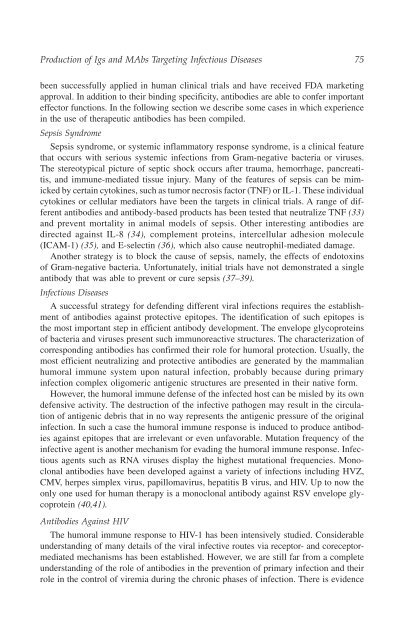Immunotherapy for Infectious Diseases
Immunotherapy for Infectious Diseases
Immunotherapy for Infectious Diseases
You also want an ePaper? Increase the reach of your titles
YUMPU automatically turns print PDFs into web optimized ePapers that Google loves.
Production of Igs and MAbs Targeting <strong>Infectious</strong> <strong>Diseases</strong> 75<br />
been successfully applied in human clinical trials and have received FDA marketing<br />
approval. In addition to their binding specificity, antibodies are able to confer important<br />
effector functions. In the following section we describe some cases in which experience<br />
in the use of therapeutic antibodies has been compiled.<br />
Sepsis Syndrome<br />
Sepsis syndrome, or systemic inflammatory response syndrome, is a clinical feature<br />
that occurs with serious systemic infections from Gram-negative bacteria or viruses.<br />
The stereotypical picture of septic shock occurs after trauma, hemorrhage, pancreatitis,<br />
and immune-mediated tissue injury. Many of the features of sepsis can be mimicked<br />
by certain cytokines, such as tumor necrosis factor (TNF) or IL-1. These individual<br />
cytokines or cellular mediators have been the targets in clinical trials. A range of different<br />
antibodies and antibody-based products has been tested that neutralize TNF (33)<br />
and prevent mortality in animal models of sepsis. Other interesting antibodies are<br />
directed against IL-8 (34), complement proteins, intercellular adhesion molecule<br />
(ICAM-1) (35), and E-selectin (36), which also cause neutrophil-mediated damage.<br />
Another strategy is to block the cause of sepsis, namely, the effects of endotoxins<br />
of Gram-negative bacteria. Un<strong>for</strong>tunately, initial trials have not demonstrated a single<br />
antibody that was able to prevent or cure sepsis (37–39).<br />
<strong>Infectious</strong> <strong>Diseases</strong><br />
A successful strategy <strong>for</strong> defending different viral infections requires the establishment<br />
of antibodies against protective epitopes. The identification of such epitopes is<br />
the most important step in efficient antibody development. The envelope glycoproteins<br />
of bacteria and viruses present such immunoreactive structures. The characterization of<br />
corresponding antibodies has confirmed their role <strong>for</strong> humoral protection. Usually, the<br />
most efficient neutralizing and protective antibodies are generated by the mammalian<br />
humoral immune system upon natural infection, probably because during primary<br />
infection complex oligomeric antigenic structures are presented in their native <strong>for</strong>m.<br />
However, the humoral immune defense of the infected host can be misled by its own<br />
defensive activity. The destruction of the infective pathogen may result in the circulation<br />
of antigenic debris that in no way represents the antigenic pressure of the original<br />
infection. In such a case the humoral immune response is induced to produce antibodies<br />
against epitopes that are irrelevant or even unfavorable. Mutation frequency of the<br />
infective agent is another mechanism <strong>for</strong> evading the humoral immune response. <strong>Infectious</strong><br />
agents such as RNA viruses display the highest mutational frequencies. Monoclonal<br />
antibodies have been developed against a variety of infections including HVZ,<br />
CMV, herpes simplex virus, papillomavirus, hepatitis B virus, and HIV. Up to now the<br />
only one used <strong>for</strong> human therapy is a monoclonal antibody against RSV envelope glycoprotein<br />
(40,41).<br />
Antibodies Against HIV<br />
The humoral immune response to HIV-1 has been intensively studied. Considerable<br />
understanding of many details of the viral infective routes via receptor- and coreceptormediated<br />
mechanisms has been established. However, we are still far from a complete<br />
understanding of the role of antibodies in the prevention of primary infection and their<br />
role in the control of viremia during the chronic phases of infection. There is evidence


